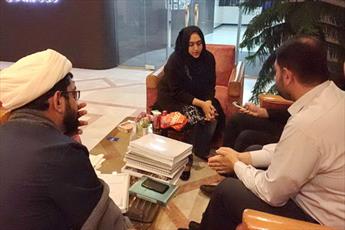Hawzah News Agency – Prof. Muhammad Legenhausen is an American Academic who has been living in Iran for a number of years and is one of the most prominent teachers of Philosophy. In 2010, he was chosen as the “Face of Philosophy.”
In an interview with Hawzah News Agency, he said, ‘My initial presence in Iran surprised me a lot as people here were interested in philosophical issues, unlike in the United States or Europe. In the USA, if you told someone that you studied philosophy, they will reply that couldn’t you have studied a subject that would have made you money? I have an interesting memory from about 25 years ago when I used to live in Tehran. A taxi driver asked me where I was from and what I was doing here. I replied that I am working on Philosophy. He then asked if I have studied Islamic Philosophy, to which I replied that I had a little. He then asked if I had studied Ibn Sina and Shurawardi and what was my opinion about Mulla Sadra. I asked him, “Are you a taxi driver or a teacher?” He replied, “No, but this is common knowledge.” This thirst is a merit of the Iranian people.’
‘I must confess that the most important revolution in the Islamic World occurred in Iran. Philosophical thought about the Philosophy of Politics of the Islamic Republic is something new and profound. After 35 years of this revolution, it is still early to expect philosophy to come up with something about this revolution. Nonetheless, work has started in this field; Praise be to Allah, that we have many scholars that are working on the Philosophy of Islamic Politics and many good books and discussions have been produced or are taking place.’
This American academic added, ‘The condition of Philosophy in Iran was good and it is currently developing; in addition, there are now seminary scholars who have a grasp of Western Philosophy, as well as university teachers who understand Islamic Philosophy and this is a good platform for the further advancement of philosophical thought in Iran. Also, there are some very good students who are interested in Islamic Philosophy and are aware of Western Philosophy.’
‘It can be said that one of the most influential American philosophers, on the subject of Philosophy of Religion, is Alvin Plantinga. However, to what extent is he known amongst the American people? If a person does not study philosophy as a subject, he will never know who Alvin Plantinga is! However, in Iran he is quite famous. I was surprised that even the Iranian youth were interested in him. I was really shocked; I was thou I was a footballer, that’s how much attention they gave me. Therefore, the fountains that we see today in the Islamic Republic of Iran are very firm and solid.’
Prof. Legenhausen also pointed to the two letters that the Leader of the Revolution, Sayyid Ali Khamanei, wrote to the youth of Europe and America and said, ‘This was a great action and I hope that he continues doing them, and not just at instances when a terrorist attack has just happened. If he continues to send letters over a period of time, slowly, slowly, it will start having the desired effect. The West, in the writings that I have seen about his personality, want him to remain anonymous and definitely don’t want his advices to gain an interest.’
‘Whenever the Leader writes a letter, the Western Media introduce it in such a way that no one will pay attention to it. In some of the western newspaper, after he wrote his letter, it was written that this is just the normal rhetoric coming from Iran in which they blame everything on the United States of America and this is just a repeat of that. However, this is not the reality, and, as you know, his letter gradually reached his intended audience and in my opinion, it had a positive effect. Especially for someone like me, who, when wanting to speak to academics and scholars outside of Iran, is confronted by someone saying that Iran also has a terrorist mentality can say that “look, see what the Leader has said, hence you cannot have such a thought about the Shia School of Thought,” and this is very important.’
End.




Your Comment